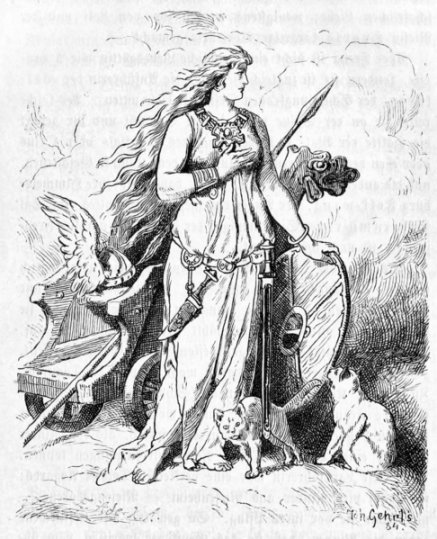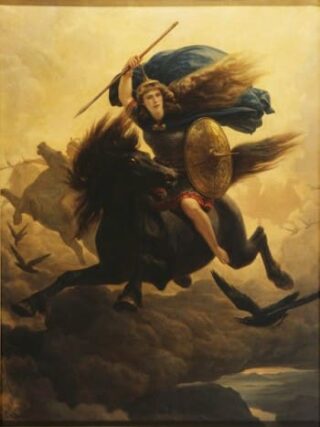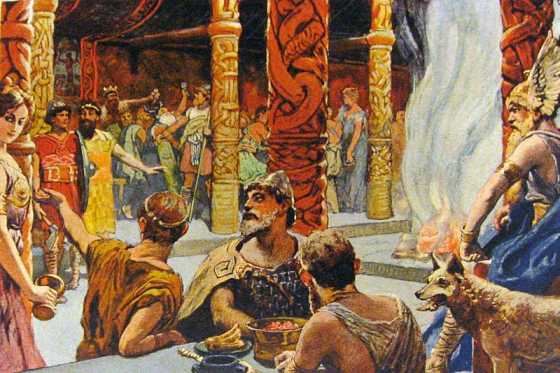Valhalla is Odin’s great hall in Asgard where the best and bravest warriors who die in battle are taken by the Valkyries. There they train in combat every day, and feast at night, all in preparation for Ragnarök when they will fight the great wolf Fenrir.
However, there is a lot more to Valhalla than first meets the eye. One example is that it wasn’t only the warriors who died in battle who went there. Others who were favored by the gods, and especially by Odin, could also be welcomed through its gate, the Valgrind.
And, was it really the best warriors who went there? Surely they would be the winners in a battle, and thus not die. As it were, Odin seems to have been just as concerned with numbers, as with martial prowess alone. Then again, if he really wanted someone, he or the valkyries could tip the scales, ensuring that they would end up dead.
The Great Hall of Valhalla
Valhalla is the anglicized name for the Old Norse Valhǫll (written Valhöll in modern day letters). It is a combination of Val, which means slain, and -höll, meaning hall, so literally the name means “hall of the slain”.

The slain warriors who lived in Valhalla were the Einherjar (army of one/those who fight alone). They were preparing for the day they would join Odin when he was to face the wolf Fenrir at Ragnarök, the prophesied end time of the gods.
Valhalla is described in both the Prose Edda and the Poetic Edda, but the most reliable source is the poem Grímnismál (The Sayings of Grímnir) from the Poetic Edda. In the poem Odin is captured and tortured by a king called Geirröd, and only his son Agnarr is willing to help him.
In the story, Odin shares a great many details about many things from Norse mythology with the young Agnar. As a source of mythical facts it is quite similar to another Poetic Edda poem called Vafthruthnirsmál. From the poem, we have a number of facts about the size and design of Valhalla.
Location of Valhalla
I will get into who actually gets to go to Valhalla later, but for those who do, the journey first takes them to Asgard. In the realm of the Aesir gods, Odin has a large estate, or region, named Gladsheim.
All, or most of the gods and goddesses have their own large estates and in them, they have a grand hall. Odin has a couple of halls. The first is the Valaskjalf, with its roof of pure silver. Inside is his throne the Hlidsksjalf from which he can see into all the realms. Then, in an area called Gladsheim, the great hall Valhalla stands.
Importantly, outside of Valhalla is also where Loki finds the mistletoe which ends up being the weapon that kills Balder. This is described in chapter 15 in the Gylfaginning from the Prose Edda.
“Then said Frigg: Neither weapon nor tree can hurt Balder, I have taken an oath from them all. Then asked the woman: Have all things taken an oath to spare Balder? Frigg answered: West of Valhalla there grows a little shrub that is called the mistletoe, that seemed to me too young to exact an oath from.”
This mention further shows how central Valhalla is to many of the ancient Norse myths.
Great in Both Size and Splendour
Before you even get to the great hall, you need to pass through the main gate, Valgrind, meaning “the gate of the slain”. As you come to the hall, you will be met by a marvelous sight.
Having passed through the gate, you will see, depending on the source, either a single tree Glasir, or a grove of trees, the Glasislundr which is described in the Skaldskaparmál, chapter 34.
“In Ásgard, before the doors of Valhall, there stands a grove which is called Glasir, and its leafage is all red gold”.
Walking past the grove of trees, you will likely first notice the wolf that is guarding the western door, a great eagle soaring above it. As you come closer, the details of the hall will become clear.
The roof is made of giant spears used as rafters, and it is clad with golden shields. It has five hundred and forty doors, each one so wide that eight hundred men can walk out side by side. Then when you come inside you see that all the benches are covered with chain mail.
Who Actually Went to Valhalla
It is a common belief that the bravest warriors who fell in battle would be chosen to go to Valhalla. However, there is the issue of Freyja apparently getting first pick of the fallen warriors, taking half for herself. They would go to her estate Folkvangr, where her hall Sessrumnir stands.

Johannes Gehrts, Public domain, via Wikimedia Commons
I believe this is based on some misunderstanding. Instead I think the correct view would be that Freyja leads the valkyries, and chooses first among those destined to go to Valhalla. This makes a lot more sense, than for Odin to always get the “scraps” and for Freyja to amass some great army apparently for no reason.
Another caveat to this belief is that in the eyes of Norsemen, Odin was a god that could be bartered with. Gods were seen as someone you could make offerings to, and then expect some deal to be made. Striking a deal with Odin could help tip the scales in your favor.
Odin would choose winners and who died
A reference to this is found in an exchange between Loki and Odin in the Poetic Edda poem Lokasenna. In the poem, Loki is thrown out from a feast in Aegir’s hall, and comes back in and insults all the other gods. In this insult hurled at Odin, he points to how Odin apparently meddles in who will win a battle. To be fair, Odin as much as admits it is true, before he challenges Loki’s manhood with an insult of his own.
Loki spoke:
22. “Be silent, Odin! You do not set the fate of the fight among men justly; you often gave to him who did not deserve the gift, the prize of battle to the weaker.”
Odin spoke:
23. “Though I gave to him who did not deserve the gift, the prize of battle to the weaker; you were eight winters under the earth, milking cows as a maid, (yes, and you bore children; your soul must seem unmanly.)”
Tipping the scales like this, the actual best men would likely die in battle, and thus end up in Odin’s hall.
The Valkyries Could Also Influence Who Died in Battle

In another interesting twist, the Valkyries themselves could also influence who might die in battle, and eventually go to Valhalla. A reference to this is found in the heroic Saga of the Volsungs. The valkyrie Brynhild had crossed Odin’s will, and as punishment, he put her in a deep sleep. Having no fear, the hero Sigurd frees her from her sleep, and Brynhild then tells him what led to her being there.
Volsung Saga chapter 20
Then Brynhild speaks again and says, “Two kings fought, one hight Helm Gunnar, an old man, and the greatest of warriors, and Odin had promised the victory unto him; but his foe was Agnar, or Audi’s brother, and so I smote down Helm Gunnar in the fight; and Odin, in vengeance for that deed, stuck the sleep-thorn into me, and said that I should never again have the victory, but should be given away in marriage; but there against I vowed a vow, that never would I wed one who knew the name of fear.”
Just how the valkyries guided, or determined the outcome of a battle is related in a great poem called “The Song of the Spear”, which is found in the Njals’ saga. It is well worth a read.
Falling in Battle Wasn’t Always Necessary
The great majority of the ones who went to Valhalla were warriors who fought and died in battle. However, this wasn’t always the case. Heroes and fierce warriors who died outside of battle could also end up in Valhalla.
Finally, in at least one instance,you could apparently end up there pretty much as punishment, or amusement for a true hero.
The best known example of both these circumstances for someone going to Valhalla is found in the story of Helgi Hundingsbane. Helgi, is the half-brother of Sigurd whom I mentioned above. He got his name after he killed a king named Hunding, his name Hundingsbane, literally being “the bane of Hunding”.
Helgi Hundingsbane is one of the great heroes in Norse mythology. Even at his birth he was recognized as someone who would be a great warrior, the Norns carving out his fate. In a bit of drama, Helgi would end up being killed by his wife Sigrun’s own brother Dag.
However, even though Helgi died at the hands of Dag, not in battle but rather in a surprise attack, he was welcomed in Valhalla as a hero. When he arrives, Odin welcomes him, and then tells him that in Valhalla anyone must obey Helgi. Upon this, Helgi sets out harassing the late King Hunding, who is also in Valhalla. After that he was very much on the receiving end of all kinds of menial tasks Helgi could put him to.
The Warriors Life in Valhalla

In Valhalla, the warrior’s life is described pretty much as people think. The once fallen warriors joined the ranks of Odin’s army, the Einherjar. Theirs was a life of hard battle training during the day, and feasting on great food and mead at night. Bringing them the food and mead were beautiful valkyries, likely the same ones who brought them there in the first place.
After a hard day of fighting, the warriors were healed, or brought back to life in time for supper. Being true warriors, there was no ill will among them, instead they shared the goal of one day fighting against the great wolf Fenrir at Ragnarök.
The life of the Einherjar is mentioned in several places in ancient texts. One such reference is found in the Poetic Edda poem Vafthrutdnirsmál, stanza 40 and 41.
Odin spoke:
- “Eleventh answer me now, l if you are all knowing
The fate that is set for the gods:
What men are they who in Odin’s home
Each day goes into battle?”
Vafthruthnir spoke:
- “The Einherjar all | in Odin’s hall
Each day goes into battle;
They kill each other, | yet travel from battle
All fully healed soon to sit together.”
The Best Food and Drink
Being Odin’s chosen warriors, they were served only the best food and drink. The mead, which is a clear alcoholic drink and a bit light beer, flowed from the udders of the magical goat Heidrun. Standing on the roof of Valhalla, Heidrun was foraging on the lowest leaves of the Yggdrasil. From her udders then flowed the best mead, into large wats or vessels which the valkyries served from.
This is detailed in the Poetic Edda poem Grimnismól, chapter 25.
The goat Heidrun | stands by Odin’s hall,
Feeding on the branches of Læradr;
Filling large pitchers | with the best mead,
A never ending flow.
For their food, they all ate meat from the great boar (or pig) Sæhrímnir, prepared for them by the cook Andhrímnir, in the great kettle Eldhrímnir. After having been cooked and eaten, the boar (or pig) is resurrected each morning to be cooked and eaten anew.
This, again from the Poetic Edda poem Grimnismól, chapter 18.
In Eldhrimnir | Andhrimner cooks
Sæhrimnir’s sizzling flesh,
The best of food, | but few men will know
What the Einherjar feasts on.
There is some discussion among scholars about what kind of animal Shærimnir actually was as the translation isn’t necessarily simple. However, one really only has to think what the warriors of the Viking Age would most wish for. It sure wouldn’t have been fish or chicken, but a great big boar or pig would have been right up there.
Frequently Asked Questions
No, mostly warriors who died in battle would go to Valhalla, and not even all of them. However, exceptions were made for heroes and some others.
Valhalla is a great hall, one of many, dotting the realm of Asgard.
The Christian concept of Heaven is different and not the same as Valhalla. In the VIking Age, there were several places you might end up in the afterlife. Even Hel wasn’t necessarily bad.
Featured Image Credit: Max Brückner, Public domain, via Wikimedia Commons
